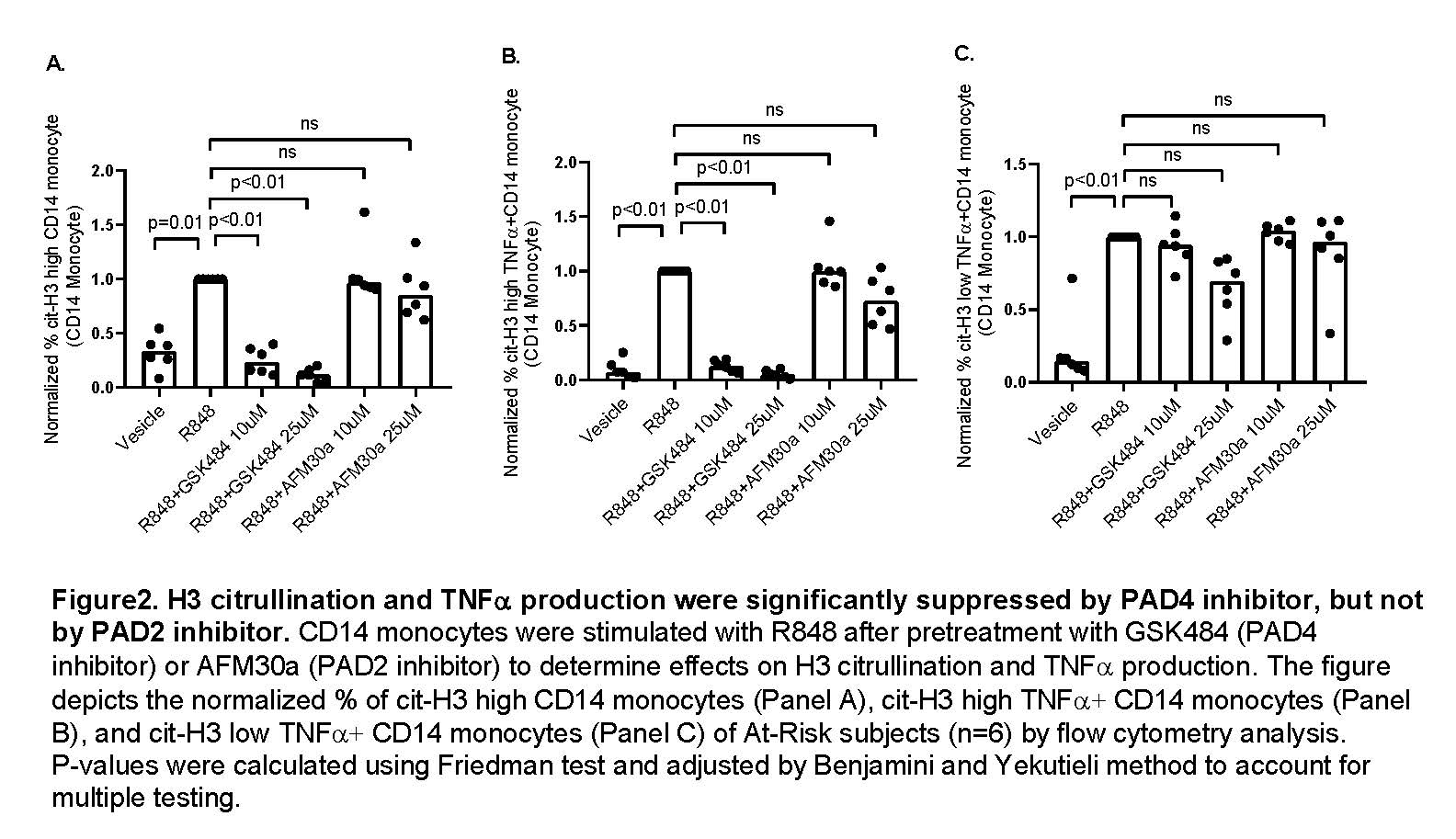Session Information
Session Type: Poster Session (Sunday)
Session Time: 9:00AM-11:00AM
Background/Purpose: Our group previously demonstrated that sputum neutrophils from subjects At-Risk for future rheumatoid arthritis (RA) spontaneously form neutrophil extracellular traps with elevated histone H3 (H3) citrullination, which were associated with mucosal inflammation and local anti-citrullinated protein antibody (ACPA) generation (Okamoto ACR 2018). Also, enhanced H3 citrullination and functional/metabolomic alterations have been found in peripheral blood CD4 T cells of At-Risk subjects. However, it is unknown in what other cell types elevated H3 citrullination could be observed, and how this phenotype is related to functional alterations in cells. Herein, we explored using mass cytometry and confirmatory flow cytometry H3 citrullination and cytokine/chemokine/metabolomic signatures in peripheral blood immune cells following ex vivo toll-like receptor stimulation.
Methods: 13 serum ACPA (+) At-Risk subjects without synovitis, 14 ACPA (+) Early RA patients, and 13 matched healthy controls were included. Freshly drawn whole blood was fixed just after blood draw, or incubated with or without stimulants including LPS and R848 (TLR7/8 agonist) in the presence of protein transport inhibitor for 6 hours and then fixed. Cells were stained with 39 metal conjugated antibodies, and mass cytometry analysis was performed. Batch adjustment was performed before data analysis. Separately, CD14 monocytes were stimulated with R848 after pretreatment with GSK484 (PAD4 inhibitor) or AFM30a (PAD2 inhibitor) to determine effects on H3 citrullination and cytokine production. In addition, CD14 monocytes were cultured on coverslips with stimulant, and immunofluorescence staining was performed to examine H3 citrullination and morphologic changes.
Results: The % of CD14 monocytes with elevated H3 citrullination following ex vivo LPS and R848 stimulation was significantly higher in ACPA (+) At-Risk subjects compared to healthy controls (Figure 1A and 1B). CD14 monocytes in At-Risk subjects with high citrullinated H3 (cit-H3) levels were skewed to produce more TNFα compared to cit-H3 low CD14 monocytes (Figure 1C). H3 citrullination and TNFα production were significantly suppressed by PAD4 inhibitor in cit-H3 high CD14 monocytes, but not by PAD2 inhibitor (Figure 2A and 2B). TNFα production by cit-H3 low CD14 monocytes was not affected by PAD4 or PAD2 inhibitor (Figure 2C). Immunofluorescence staining revealed CD14 monocytes with cit-H3 formed extrusions of DNA with PAD4 co-localization, which was compatible with the development of monocyte extracellular traps (METs).
Conclusion: Peripheral blood CD14 monocytes in subjects At-Risk for RA demonstrate increased cit-H3 expressing MET formation with cytokine skewing to TNFα in a process mediated by PAD4. These finding suggests enhancement of histone H3 citrullination and aberrant TNFα production may play a role in the development of RA. Further studies are needed to determine the role of this phenotype in the generation of ACPA and future development of classified RA.
To cite this abstract in AMA style:
Okamoto Y, Hsieh E, Schuyler R, Seifert J, Feser M, Norris J, Demoruelle M, Deane K, Holers V. Mass Cytometry Identifies Enhanced Histone H3 Citrullination and TNFα Production by CD14 Monocytes in Subjects At-Risk for Future Development of Rheumatoid Arthritis [abstract]. Arthritis Rheumatol. 2019; 71 (suppl 10). https://acrabstracts.org/abstract/mass-cytometry-identifies-enhanced-histone-h3-citrullination-and-tnf%ce%b1-production-by-cd14-monocytes-in-subjects-at-risk-for-future-development-of-rheumatoid-arthritis/. Accessed .« Back to 2019 ACR/ARP Annual Meeting
ACR Meeting Abstracts - https://acrabstracts.org/abstract/mass-cytometry-identifies-enhanced-histone-h3-citrullination-and-tnf%ce%b1-production-by-cd14-monocytes-in-subjects-at-risk-for-future-development-of-rheumatoid-arthritis/


